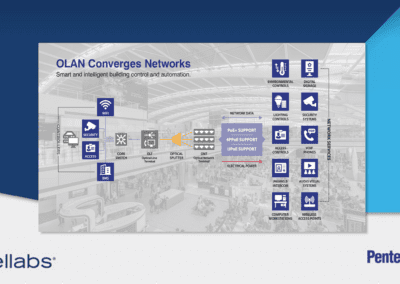Operational Efficiencies
Improving IT efficiencies by increasing the speed of LAN configurations, monitoring, troubleshooting and MACs, while reducing human error and security risks.
Speed IT productivity and ultimately business productivity
CIOs and IT staff face enormous challenges as the network they are tasked to manage grows more and more complex in the digital workplace. Furthermore, they are chartered to do this while facing internal difficulties with staff reduction, talent retention struggles, skillset gaps, training impacts and on-going professional certification demands. No doubt these are the reasons why improving operational efficiencies is a top priority for CIOs and IT management in this digital transformation. Their Key Performance Indicators (KPI) are often directly tied to these operational efficiency statistics and thus pay raises, bonuses and promotions.
Tellabs Optical LAN creates network efficiencies by promoting automation with global policy profiles for machine-to-machine actions that limit human-to-machine actions in support of the digital workplace. Mission-critical yet repetitive operational tasks can be effectively reduced to zero dollars, and with centralized intelligence and management quick views, fast isolation and easy drill-down uncovers root causes and speeds resolution is optimized to simplify the true enterprise digital transformation.
Quick Facts
- Tools that speed the installation of Passive Optical LANs
- Repeatable global profiles ensure consistent policies and procedures
- Quick views, fast isolation and easy drill-down, help speed fix
- Web Browser User Interface enables faster Moves, Adds & Changes (MACs)
- Centralized intelligence, automation and management for Powered Devices
- Functions that can improve IT and overall business productivity
Reduced human touch with consistent policies, improves reliability and security
Automating network management functions
The aim of Tellabs Optical LAN and Tellabs Panorama PON Manager is to enhance IT efficiencies through automation and M2M functions, accelerating LAN installations, configurations, global policies, monitoring, troubleshooting, and moves-adds-changes, while minimizing human error and security risks. It significantly boosts Optical LAN management’s speed for doing moves, adds, and changes, and offers three key areas for IT staff to enhance operational efficiencies: Installation, Management, and Automation.
Take advantage of the ONT’s inherent efficiencies
Optical LAN ONTs are designed with no local management access because there is little need for human touch. The ONTs are basically simple optical-to-electrical terminals and they are capable of delivering all the connections, services and applications required for an Optical LAN. They are highly reliable and secure, which ultimately helps improve operational efficiencies.
Macro network orchestration and global policies
Since the intelligence, control and management of the Optical LAN are centralized, the Tellabs Panorama PON Manager does most of the heavy lifting. However, there are some underlying inherent system-wide qualities of the Optical LAN technology that positively impact operational efficiencies. At its core, Optical LAN enables software-defined resources to be dynamically allocated based on real-time needs. When services and applications (e.g., data, voice, video, WAP, IP cameras, building automation, security) traverse the Optical LAN, bandwidth, Quality of Service (QoS), Network Access Control (NAC) and Power Device (PD) management happen automatically. Bandwidth is assigned on a per-service, per-port, per-end-device and per-user-basis as part of the provisioned Service Level Agreement (SLA) attributes.
Help IT staff to work more efficiently
Another top 10 CIO priority is attracting and retaining a skilled workforce. Legacy copper-based LANs have equipment on every floor of every building requiring physical monitoring, provisioning, troubleshooting and maintenance. The IT staff needs weeks of training to be comfortable with the programming of MACs and other network modifications. Optical LAN simplifies aggregation, distribution and access with less equipment and less cabling, thus requiring fewer IT staff touches and less IT staff training.
Reduced human touch directly improves network reliability and security
It’s a proven fact that humans are responsible for the majority of network outages and security breaches. Tellabs Optical LAN and Tellabs Panorama PON Manager enable more automation and machine-to-machine actions, which helps to limit human touch. Thus, there is a direct correlation between improving operational efficiencies and increasing network uptime plus tightening network security.
Looking for more information?
If you still need additional details, and even greater technical explanation, then click on the “Download Overview” button below to access our comprehensive operational efficiencies solution overview.



